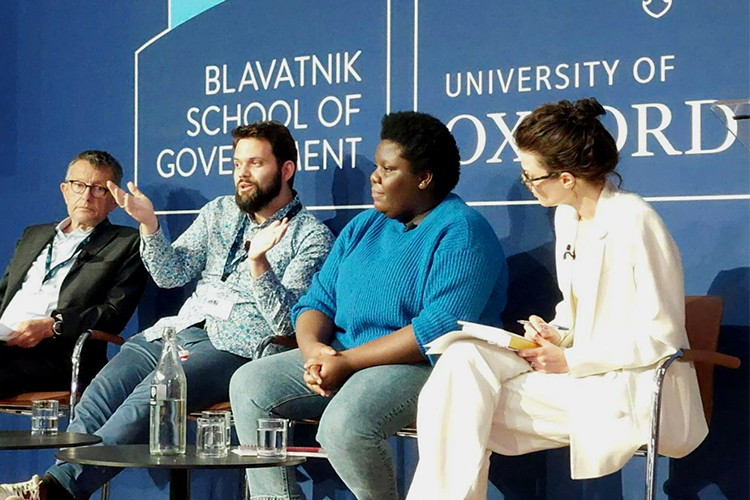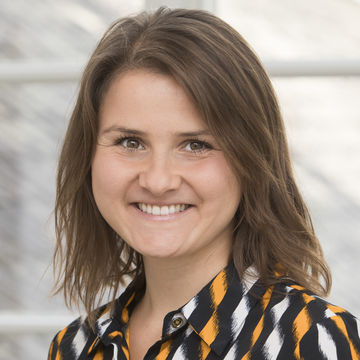Publication A book highlighting the importance of social economy science as a means of addressing the biggest societal challenges
Gorgi Krlev co-edited a pioneering new book that provides the first comprehensive analysis of why and how social economy organisations drive systemic change, foster resilience and create superior value for society.
Published in open access by Oxford University Press, Social Economy Science: Transforming the Economy and Making Society More Resilient was launched at the Social Outcomes Conference held in Oxford on 14-15 September. The Government Outcomes Lab (GO Lab), with its Executive Director Andreea Anastasiu at its helm, convened the fifth edition of this important conference, which is concerned with how to leverage positive impact and worthy social outcomes and brings together renowned academics, practitioners and policymakers from around the globe. Mara Airoldi, Director of the GO Lab that is part of the University of Oxford’s Blavatnik School of Government, greeted delegates along with Jonathan Michie, Pro-Vice Chancellor of the University of Oxford and President of Kellogg College.
The book launch involved Bayo Adelaja, social entrepreneur and founder of Do it Now Now, an organization based in London and concerned with promoting racial equality. Other contributions came from Mario Calderini, Director of the TIRESIA research centre at Politecnico di Milano and GO Lab's own Research Director Eleanor Carter. Both are part of a group of leading academics, as well as practitioners, who wrote chapters of the book.

Based on extensive empirical research, with a strong practical and policy component, the book draws on organizational theory and transition studies to provide a systematic perspective on complex multi-stakeholder forms of action. It discusses the social economy's role in promoting innovation for impact, as well as its role as an agent of societal change and as a partner to businesses, governments, and citizens. “The history of the book goes back to the 2021 Social Economy Science Conference, which we convened together with the European Commission. We previously issued a series on the subject in Stanford Social Innovation Review,” adds Gorgi Krlev.
The publishing of Social Economy Science by Oxford University Press makes the underdog the winner. It moves a phenomenological area from the fringes of researchers’ attention into the limelight.
“The publishing of Social Economy Science by Oxford University Press makes the underdog the winner. It moves a phenomenological area from the fringes of researchers’ attention into the limelight,” the co-editors write in the preface. “This book has its seeds in a small idea: the idea to organize an intimate academic exchange on issues surrounding the social economy as a sister event to the European Social Economy Summit (EUSES), which was planned for November 2020 in Mannheim and was held virtually in May 2021 due to the COVID-19 pandemic. Because of the unfolding crisis, and made possible by a strong partnership with the European Commission, we chose to move our event online too, but also to make it much bigger than initially planned by opening it up to a wider audience. What started as a gathering of eighty researchers became the Social Economy Science Conference, with more than 800 registered academics, practitioners, and policy-makers. In the run-up to the event, when we saw that the interest was substantially larger than we had expected, we placed bets on how many participants we would reach. Even the most daring among us far underestimated how many people would want to hear about cutting-edge research on, for example, how social and solidarity organizations were buffering the effects of the crisis for society’s most vulnerable groups; or how social entrepreneurship and social innovation play an essential role in addressing persistent societal problems, including the challenge of creating more democratic, equitable and participatory forms of organizing; or how impact investing and social outcomes contracting by governments change the ways in which we think about funding the common good.”
One of the few positive effects of the COVID-19 pandemic
“The large turnout of participants was certainly not least due to a world-class line-up of academics and support for the event by the European Commission. However, it was also one of the few positive effects of the COVID-19 pandemic,” the co-editors add. “The global crisis highlighted what holds society together and what really matters to people: solidarity and social relations, values and caring, collective instead of individual action. These are all traits and virtues that the social economy embodies like no other organizational field. The crisis represented the culmination of a realization that only gradually emerged over the years: a realization that we had unduly ignored phenomena that might hold the answer to ills which society has been grappling with for ages. Such ills include social inequalities, societal polarization, and environmental degradation—and combating these has always been at the heart of the social economy.”
AUTHORS
 Dominika Wruk Assistant Professor for Sustainable Entrepreneurship at the University of Mannheim (Germany)
Dominika Wruk Assistant Professor for Sustainable Entrepreneurship at the University of Mannheim (Germany) Giulio Pasi Scientific Officer at the European Commission Joint Research Centre, and Professor of Economics at the Universidad Loyola, Seville (Spain)
Giulio Pasi Scientific Officer at the European Commission Joint Research Centre, and Professor of Economics at the Universidad Loyola, Seville (Spain)  Marika Bernhard Sustainability Lead and Corporate Strategy at German Football Association, and founder and chairwoman of Social Entrepreneurship Baden-Württemberg
Marika Bernhard Sustainability Lead and Corporate Strategy at German Football Association, and founder and chairwoman of Social Entrepreneurship Baden-Württemberg Campuses